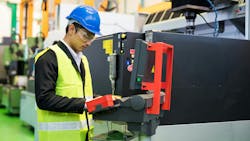‘Perception problem’ pours from new survey that U.S. manufacturing remains too technologically outdated
What you’ll learn:
- 72% of surveyed employees said outdated technology is hurting hiring as reshoring ramps up.
- 31% plan to boost their reshoring efforts due to the phased-in and threatened tariffs.
- But 28% believe talent shortages could slow or significantly delay those efforts.
- Only 8% believe they are doing enough to reskill the workforce.
LAS VEGAS—On top of all the other stressors like tariffs and potential COVID-like supply chain chaos, the reshoring push, and the labor shortage, new survey results from Hexagon just released here show another chief concern: U.S. manufacturers still have, despite a lot of progress, a “perception problem” to overcome that plant technology is outdated and that U.S. factories are undesirable workplaces, especially for younger Gen-Z workers.
Reps for Hexagon’s manufacturing intelligence division in the Americas released topline findings here June 17 at Hexagon LIVE from their State of Manufacturing 2025 Report (due out in full next month) that show a healthy majority—72%—of the 500 U.S. manufacturing employees surveyed in May said outdated tech is hurting hiring as reshoring—the stated goal of Donald Trump’s tariffs—ramps up.
See also: Without strict security governance, AI could become a liability
The officials stressed the survey, commissioned by Hexagon and conducted by market researcher Dynata, reached a range of U.S. manufacturing workers, from C-suite executives through senior and mid-level managers on down to entry-level employees.
While 31% of all those polled said they plan to boost their reshoring efforts due to the phased-in and threatened tariffs, 28% believe talent shortages could slow or significantly delay those efforts, and only 8% said they believe they are doing enough to reskill the workforce.
“Manufacturers are making bold moves to modernize, but our data shows they must move faster on tech adoption and workforce development, to meet a moment defined by economic uncertainty, labor shortages, and reshoring,” said Paul Rogers, president, Americas and Asia Pacific, of Hexagon’s Manufacturing Intelligence division.
“Outdated technology isn’t just an operational hurdle; it reinforces the perception that manufacturing isn’t a forward-looking, modern career choice. Tools like AI and digital twins can help democratize manufacturing and give more workers a new perspective, but lasting change requires more than innovation. It demands reskilling, breaking old stigmas, and rebranding the industry as one built for America’s future.”
Webinar replay: Building new facilities in the U.S. to avoid tariffs? Not so easy or cheap
Rogers stressed during an evening press conference that U.S. manufacturers must break the “perception problem” and pioneer solutions that appeal to the newest generation of workers raised on video games and handheld technology at their fingertips. “They expect workplaces to be highly automated,” he added during the media event.
He also stressed that Hexagon’s various products—its Autonomous Metrology Suite, powered by Nexus applications, the Maestro CMM, PRESTO robotic stations, new handheld 3D scanners, additive manufacturing advances, and ESPRIT Edge and Digital Twins software products—are geared toward bridging the divides that the new survey identifies.
“Workforce gaps guide our portfolio,” Rogers added.
Disconnect between leadership and their workers
The research also found that 60% believe their companies are doing enough to improve manufacturing’s image with new talent, even though only 8% said enough was being done to reskill a workforce that, Rogers noted, is predicted to fall about 2 million people shy of the U.S. plant workforce that will be needed by 2033.
See also: More than half of manufacturers piloting digital transformation, Rockwell Automation reports
However, half of the respondents are very confident the U.S. labor can meet the demands of the next five years, though 28% said they believe workforce challenges will slow or significantly limit reshoring efforts.
Further, manufacturers are running up against a critical barrier: 72% say outdated technology is preventing them from attracting and retaining workers.
More Hexagon findings, with much reflecting the disconnect in the ranks:
- Almost two-thirds surveyed said they’ve solved their image problem.
- 60% said they’re doing enough to make the industry more appealing to new talent.
- 86% of executives believe perception is improving—but only 59% of entry-level employees agree with leadership.
- And other hurdles remain: 49% cited including limited career growth, 44% said their work environments are outdated or unsafe, 44% said their work is repetitive or low-skill work, and 42% said the workplace culture is male-dominated.
Uncertainty remains a lingering worry
At the same time, uncertainty is top of mind: 56% of the Hexagon survey respondents cited tariffs as their biggest business pressure, even ahead of inflation and supply chain disruptions. But 31% plan to increase reshoring investments in response to the shifting trade policy under Trump.
Webinar replay: As tariff war whipsaws world economy, ‘uncertainty is the new certainty'
Reshoring, according the survey, is rising. Nearly half of respondents—49%—said fully staffing reshored operations would take between a year and more than three years.
A lack of interest from new talent (39%) and insufficient skilled local labor (24%) also remain significant barriers. Among response efforts, companies are expanding upskilling and reskilling (51%) and tapping into underrepresented labor pools (33%), the Hexagon survey found.
Surveyed manufacturers also cite problem-solving (63%), digital literacy (50%), and legacy equipment skills (36%) as key gaps from applicants to their companies for new jobs. Millennials (52%) are most actively pursuing upskilling, with Gen-Z showing less interest (26%) than any generation outside of the baby boomers (2%).
AI, Aeon, digital twins and all the tech
The survey also shows new technology is essential but not widely adopted, with 96% of companies believing technology will change their operations to some degree in the next five years. When asked where, factory floors (30%), quality assurance (24%), workforce training (18%), and supply chains (17%) were the top areas highlighted by the Hexagon survey.
Podcast: In tariff times, how manufacturers can design an agile supply chain
When selecting new technologies like AI, digital twins, and robotic automation (Hexagon also threw a flashy debut here for Aeon, its new wheeled humanoid robot) it’s not just about cost savings. The respondents prioritize time savings first (65%), with easy integration with current systems at the same level of importance as cost savings (49%).
AI also is seen as a factor in reshaping jobs but not replacing workers. Nearly all the manufacturers surveyed (92%) have already begun investing in AI, while almost two-thirds (65%) said artificial intelligence technologies will help them either maintain (43%) or grow (22%) their workforce. Just 18% said they believe AI will lead to headcount reductions.
About the Author
Scott Achelpohl
Head of Content
I've come to Smart Industry after stints in business-to-business journalism covering U.S. trucking and transportation for FleetOwner, a sister website and magazine of SI’s at Endeavor Business Media, and branches of the U.S. military for Navy League of the United States. I'm a graduate of the University of Kansas and the William Allen White School of Journalism with many years of media experience inside and outside B2B journalism. I'm a wordsmith by nature, and I edit Smart Industry and report and write all kinds of news and interactive media on the digital transformation of manufacturing.

